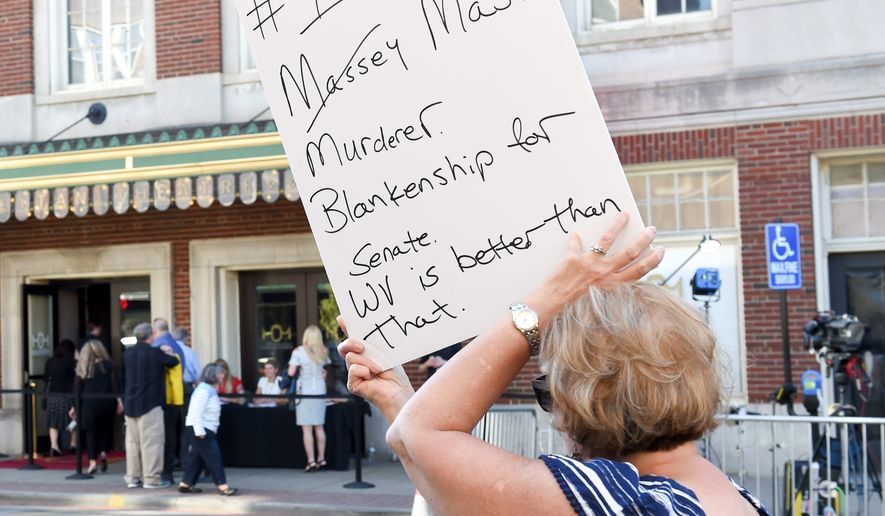MORGANTOWN, West Virginia — Insults and accusations flew Tuesday night as the three top Republicans seeking their party’s nomination for Senate in West Virginia took to the stage in the final primary debate, with each seeking to lay claim to the “true conservative” title and all distancing themselves from Washington establishment figures, including Senate Majority Leader Mitch McConnell.
The contentious forum, hosted by Fox News at the downtown Metropolitan Theatre here, quickly turned ugly. Rep. Evan Jenkins, a Democrat-turned-Republican who is clinging to a slight lead in recent polls, suggested West Virginia Attorney General Patrick Morrisey is partly responsible for the state’s opioid crisis because he and his wife worked as Washington lobbyists.
“If you want to see the problem, it is the pill pushers, and Patrick Morrisey has represented those people for years and made millions,” Mr. Jenkins said, immediately drawing a harsh rebuke from the attorney general.
“Did your mom ever tell you [that] you should wash your mouth out with soap for those lies?” Mr. Morrisey said. “No one has done more to go after the opioid epidemic.”
Don Blankenship, the former CEO of Massey Energy who spent a year in federal prison in connection with the fatal Upper Big Branch mine explosion of 2010, said both of his Republican foes are misleading West Virginia voters with claims they’ll “drain the swamp.”
“Let me clarify that both of these guys are right — they’re both liars,” Mr. Blankenship said.
Over the past two weeks, Mr. Blankenship has turned much of his attention away from his opponents and toward Mr. McConnell, who he says represents the worst of Washington. In a recent campaign ad, he dubbed Mr. McConnell “Cocaine Mitch” — a reference to a 2014 report that drugs were found on a ship owned by the family of Mr. McConnell’s wife, Transportation Secretary Elaine Chao.
“He interferes with elections all over this country. He’s interfering with this election,” Mr. Blankenship said, referring to PACs with ties to Mr. McConnell airing anti-Blankenship ads across the state.
But Mr. Jenkins and Mr. Morrisey also did their part to distance themselves from the majority leader, who suddenly has become one of the focal points of the race to unseat incumbent Democratic Sen. Joe Manchin.
Neither Mr. Morrisey nor Mr. Jenkins would commit to supporting Mr. McConnell as majority leader.
“Mitch McConnell hasn’t even asked for my support. I think it’s way too premature,” Mr. Jenkins said.
Mr. Morrisey also said it’s too early.
“I’m going to make the right decision after we get through the general election,” he said.
As the primary comes to a close, the political pasts of each candidate have come to the forefront. For Mr. Jenkins, his years spent as a Democrat before switching parties in 2013 is being held up by his opponents as proof he’s a fake conservative.
“I think it’s very clear West Virginians want someone with conservative values,” Mr. Morrisey said. “I’m the only one on this stage who has always been conservative.”
But Mr. Morrisey carries his own political baggage. He ran for Congress in New Jersey in 2000 before moving to West Virginia, drawing accusations he’s a political “carpet bagger.” He also refused to say Tuesday night who he voted for in the 2016 Republican presidential primary, drawing boos from the largely pro-Trump crowd.
“Patrick Morrisey won’t look at the camera, he won’t look at the people of West Virginia and say why he did not vote for Donald Trump for president in the May [2016] primary,” Mr. Jenkins said.
Mr. Blankenship said that his years of backing conservative causes in West Virginia — including spending millions of dollars of his own money in political fights against Mr. Manchin, who previously served as the state’s governor — should give him the edge among Republican voters.
“Neither of them would be up here without me,” he said of his opponents.
As for the Upper Big Branch tragedy, which claimed the lives of 29 of his miners, Mr. Blankenship maintained that the government was responsible for the blast and that he was wrongfully imprisoned.
“It was clear from the beginning to the end that it was a fake prosecution,” he said.
• Ben Wolfgang can be reached at bwolfgang@washingtontimes.com.




Please read our comment policy before commenting.